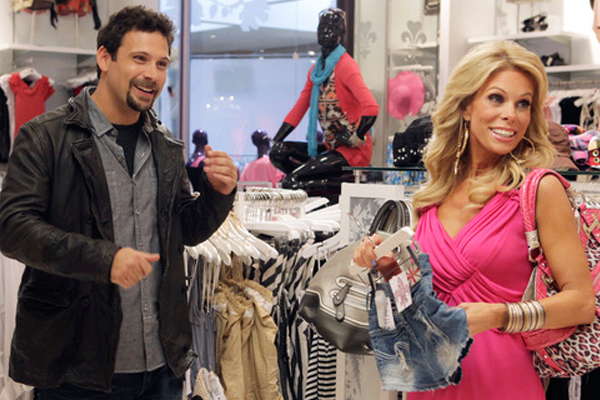Something’s amiss in the pilot for ABC’s new comedy “Suburgatory“ (Wednesdays 8:30/7:30 central). It’s not just the grotesquely exaggerated “sick soul of the suburbs” imagery — McMansions, immaculately trimmed hedges, giant swimming pools, soul-murdering malls. Nor is it the show’s smiley-faced misanthropy, which pictures every character as somewhat trivial and pathetic. No, it’s something else — an elaborate, perhaps unintentional bait-and-switch that takes a few scenes to reveal itself.
Strangely, this elusive core of dishonesty is the most interesting thing about “Suburgatory”. Without it, the sitcom would have been just another well-acted, handsomely produced half-hour comedy trying to be a variant of “Modern Family” or “The Middle” and failing. Created by Emily Kapnek, who created Nickelodeon’s “As Told by Ginger” and worked on HBO’s “Hung,” it’s about an architect and single father named George Altman (Jeremy Sisto) and his 17-year old daughter Tessa (Jane Levy). They flee Manhattan for a theoretically less debased existence in the suburbs when dad finds condoms in Tessa’s dresser drawer, because hey, teenagers never have sex in the suburbs. “When single dad George moves 16-year-old daughter Tessa out of their NYC apartment to a house in the suburbs, it’s because he wants a better place for her to spend her teen years,” says the summary on ABC’s website. “But all Tessa sees is the horror of over-manicured lawns and plastic Franken-moms.” And away we go!
This being network TV, Tessa will of course come to realize that the suburbs are just another place and that off-putting people can be nice when you get to know them — and her dad will overcome his initial awkwardness and find friendship, community, and maybe love. (Or at the very least, sex with a cheerful but shamelessly forward neighbor.) In the meantime, the series will content itself with chronicling the relocation of two deeply annoying main characters — a clueless doormat of a dad and a hyper-intelligent brat who appreciates nothing, criticizes everything, and seems to consider herself superior to the entire human race. (When dad shows Tessa her spacious new bedroom, she deems it too girly, then fixates on a cat clock on the wall and tells George, “I’m not a cat clock kind of girl.”)
Costar Cheryl Hines’ character, Dallas Royce — a mom who wants her bratty daughter to be best pals with Tessa — is the show’s only surprising creation. She dresses like a Real Housewife and spoils her daughter even worse than George spoils Tessa. But she’s kind, generous, and a good listener, and a possible candidate to fill the maternal void in Tessa’s life. She deserves her own show — one that doesn’t make you wish it was shot with an experimental interactive camera that lets viewers step through the screen and slap the main characters.
The show assures us that deep down, Tessa and George love each other, that their relationship is essentially healthy, and that neither they nor their new neighbors are irredeemable caricatures. But at the same time, the show validates Tessa’s jaundiced world view through its production design and photography, which make the Altman family’s new hometown — supposedly a typical upper middle class, upstate New York community — look as hideously slick and artificial as the morally and intellectually catatonic suburbs of “Heathers” and “Edward Scissorhands.”
If Tessa is an unreliable narrator, the show does a poor job of indicating it. That’s a storytelling technique too sophisticated for “Subugatory” – one would require the sort of delicacy that “My So-Called Life” brought to an equally self-absorbed but far more interesting heroine, one whose more smug and judgmental observations were sometimes at odds with the world she described. “It’s pretty ironic that a box full of rubbers landed me in a town full of plastic,” Tessa narrates, over images of a plastic world full of plastic people. When a neighbor shouts across the street with an offer to bring George’s wife a pot roast, and George responds, “I don’t have a wife!” the phrase echoes forlornly through the neighborhood, as if to suggest that the mere sight of a single father in the suburbs is a event on par with a Yeti sighting.
Running beneath all this weirdly passive-aggressive contempt for the suburbs, and for people in general, is an eerily dislocated quality. This quality has nothing to do with George and Tessa’s move from Manhattan and everything to do with the fact that the “typical suburb” we’re seeing bears little relation to any “typical suburb” anywhere in 21st century America that I’ve ever visited. The hedges and lawns are immaculate. Almost every resident is white. The high school is immense, its facilities handsome and new. The men are mostly metrosexual fussbudgets, one of whom is a strapping blond dude who hangs out by a swimming pool with a Blue tooth device clamped to his ear. All the women look like they’ve been recently exfoliated and tanned in a booth, and both mothers and daughters have implants. In one sight gag, a pneumatically enhanced young woman is so absorbed in a cell phone conversation that she strolls right into the deep end of a pool; George is told that he shouldn’t be concerned because that kind of thing happens all the time, and because all the girls in this town have so much plastic in them that they float. The sequence where Tessa explores her new high school features an especially damning shot from Tessa’s point of view as she passes a row of girls loitering near their lockers; every one of them sports a post-rhinoplasty bandage.
I don’t think this show is about what it says it’s about. I think it’s really about a privileged entertainment industry family that makes a mint with a successful show, moves to Beverly Hills and hates it at first, but ultimately fits in fine.

